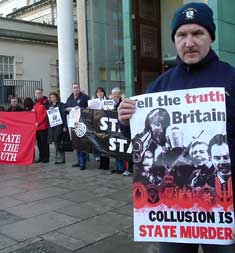6 December 2007 Edition
Collusion - families call for full disclosure

Seamus Finucane, brother of murdered solicitor Pat Finucane, wants answers about alleged RUC collusion in his brother’s assassination by a unionist death squad
BY LAURA FRIELRelatives of collusion victims have reiterated their call for full disclosure after it was revealed the British Government had allowed the recently-established Consultative Group full access to the Stevens reports.
Senior British policeman John Stevens conducted a series of investigations into allegations of British state-sponsored terrorism in the North of Ireland but, to date, the British Government has refused to publish his findings.
While families of those killed and their lawyers continue to be denied information, access has been afforded to a group appointed earlier this year by the then British Secretary of State, Peter Hain.
The fact emerged during a West Belfast meeting of the District Policing Partnership (DPP) last week when a brother of Pat Finucane called for full disclosure in the wake of access afforded to the Consultative Group.
Pat Finucane was murdered at his Belfast home in February 1989 and soon became the focus of an international campaign demanding the truth about British state involvement in the murder.
Speaking at the DPP meeting, Seamus Finucane revealed the Consultation Group had already been afforded access to the Stevens reports and demanded full public disclosure.
PSNI Superintendent Gary White, the senior officer attending the DPP meeting, declined to answer any questions on the issue. “It’s not acceptable for a senior officer in the PSNI to come to a meeting within our community but refuse to address a matter so close to the heart of our concerns,” said Seamus Finucane.
Commenting on his meeting with the Consultative Group, Seamus Finucane said the family remained to be convinced about what exactly the newly-appointed group could bring to the process above and beyond what the families, their lawyers and campaigning groups are already contributing.
“We asked them what they thought the group could do to move the British forward and towards full disclosure of the truth about collusion,” said Seamus.
A spokesperson from Justice for the Forgotten, a campaign group seeking disclosure about Britain’s role in the Dublin and Monaghan bombings, has confirmed that the Consultation Group had been granted full access to the Stevens reports.
Margaret Urwin said that, during a meeting with the group’s co-chairs, Robin Eames and Denis Bradley, it was confirmed that they have been given full access to the Stevens reports during a three-day visit to London. “They hadn’t been given a hard copy but read the script on computer,” said Urwin.
Justice for the Forgotten said they support the call for full public disclosure of the Stevens reports. “It’s a clear anomaly for this group to be given access while the families of those killed and their legal representatives remained denied,” said Urwin.
The ‘Consultative Group on the Past’ was established by the British Government in June 2007 and met for the first time in September of that year. Announcing the group’s formation, Hain claimed the initiative enabled “the people of Northern Ireland” to decide for themselves how best to deal with their past.
It wasn’t the remit of the British Government to determine how “the violent legacy of the Troubles” should be addressed, said Hain. The Consultative Group would “provide a platform for people to express their own views”, he said.
“It is time to pause and ask how a society that went through a violent and long conflict wants to deal with the past.”.
But at the same time that Hain was declaring no government interest, a clear agenda was emerging which conveniently ignored Britain as a key player in the collusion controversy.
“The question is how Northern Ireland might approach its past in a way that heals rather than poisons, that enables everyone to focus on building a shared future, not looking constantly over shoulders to a divided past.”
Campaign groups feared that in the same way in which Britain had used unionist paramilitaries to do their military dirty work, unionist political opinion was to be mobilised in support of a British agenda determined to bury the past rather than disclose Britain’s role in the conflict.
Commenting at the time, Sinn Féin MLA Francie Molloy said Sinn Féin is absolutely committed to seeing a process developed which can deliver closure for the families of those killed during the conflict:
“The key to dealing with this issue is ensuring that there is no hierarchy of victims. This includes acknowledging the fact that the British state is a protagonist in this conflict and not an innocent onlooker.
“Inevitable serious concerns do and will emerge from the fact that the Consultation Group is appointed by the British Government and will report back to the British Government which will have the final say on any recommendations.”
Those appointed by the British Government to the Consultation Group include the following: Robin Eames, former Church of Ireland Bishop of Armagh; Denis Bradley, first vice- chair of the Policing Board; GAA captain Jareth Burns; Presbyterian Minister Rev Lesley Carroll; rugby captain Willie John McBride; lecturer James Mackey, Magilligan drugs counsellor Elaine Moore; and Christian David Porter.



